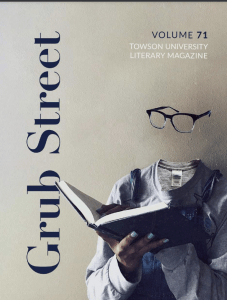This interview was conducted by Matti Ben-Lev and has been edited for clarity and length.
Prof. Jeannie Vanasco was the Grub Street advisor for four years. I thought she could provide some valuable insights and stories from her time working on Grub Street.
MBL: What was your favorite thing about working on Grub Street?
JV: My favorite thing was also the hardest: advising an entirely new staff each year. I enjoyed seeing how the different personalities and aesthetic styles of each staff shaped each issue. Some of the staff would change halfway through the academic year, and that challenged me as an instructor and an adviser. I was trying to teach my students developmental editing, copy editing, proofreading, and the history of the literary magazine, all while helping them assemble an issue. Not to mention I’m a terrible copy editor.
MBL: Yeah, I had no idea what I was doing or what copy editing actually meant when I walked into class on the first day. I was placed in the poetry group and given five poems, and I just started editing them as if I had written them, which I quickly learned is not the goal whatsoever. I have learned so much about copy editing in just a few weeks, namely, what copy editing is.
JV: As a writer, I feel deeply embarrassed whenever copy editors come back with corrections—like, I should know this stuff! But different publications have different house styles. The New Yorker, for example, puts a dieresis, which armchair grammarians mistake for an umlaut, over the second vowel in words such as cooperate, and I don’t have the mental equipment to fuss over stuff like that. Commas, sure. But a diaresis? Advising Grub Street, when I knew I was lacking in an area of experience, such as copy editing or publicity, I brought in experts. I got my start in editorial at The Paris Review, TriQuarterly back when it was a print-only publication, and the Poetry Foundation, but that was in 2006. When I was an assistant editor at Lapham’s Quarterly in 2008, someone suggested hiring a social media person, and we all laughed. So in doing Grub Street, I needed to lean more on the expertise of those currently working in the field. And maybe that was the most rewarding part of Grub Street:

introducing students to professionals. Some students even went on to work or intern at Graywolf Press, The Believer, CLMP [Community of Literary Magazines and Presses], and Simon & Schuster. A lot of students went on to fully funded MFA programs where they edited those schools’ journals such as George Mason’s So to Speak. I often encounter students who reject themselves before they even get the chance to be rejected. Seeing my students gain confidence is exciting. One of the best parts of teaching is when my students realize, “This is something I can do.”
MBL: What does Grub Street mean to you?
JV: What does it mean to you?
MBL: Well, I think walking in, I started to realize that there is a true sense of agency. That students’ decisions actually hold weight. I haven’t experienced that level of agency in a class before.
JV: That’s a great way of putting it. Grub Street is meaningful to me when students find it meaningful. I enjoyed it, but it was a lot of work. I’m still recovering.
MBL: Do you plan to advise Grub Street again?
JV: Prof. Downs will do it for three years, then Professor Harrison, then maybe me again. But if somebody else wants to take it, I won’t fight them. If TU considered Grub Street the equivalent of two courses rather than one each semester (for students and the adviser), I’d love to advise it again. But maybe I took it too seriously. I remember handing out Grub Street tote bags to everyone on staff, and then, after some of the students didn’t carry them, I said: “I’m not saying you have to carry the tote bag—” As I was speaking, I was annoying myself. But I wanted students to think of Grub Street as a close community. That was what made the staff change midyear so difficult. I didn’t want the second-semester students to feel left out.
MBL: How was the first semester different from the second?

JV: The semester assignments differed on a practical level. Because Grub Street is a print annual, I believe the staff needs to accept some writing and art before the spring semester starts. Otherwise, you’re scrambling on editorial when you should be focused on production. So I asked students to make a list of dream authors, and emerging writers whose work the students loved in an online lit mag, such as G*Mob and Muzzle. The students wrote short explanations of what excited them about the work, and then they invited some of those writers to submit. The students needed to be very strategic about how many authors they emailed. It’s not a good look to ask a writer for work—especially if you’re not with an established journal—only to then reject it. So the genre editors kept track of solicitations. Some amazing writing came out of that assignment. Because the students personalized their emails to writers, almost all the writers replied. Some gave us a soft no, as in: “If I can get something to you before the deadline, I will.” Most, however, gave us an enthusiastic yes: “Oh my gosh, I’m living out of my car right now, but I’ll send you a batch of poems in a month when I have access to my computer again.” Having worked at different lit mags in my twenties, I didn’t want to rely on the slush pile.
Sometimes you miss out on great work because not all writers feel confident enough to submit in the first place, or they haven’t heard of Grub Street. I never want to dismiss the slush pile. The slush pile is crucial to the life of literary magazines. I believe that literary magazines have a responsibility to at least try to discover new writers. The first semester also involved studying the history of American literary magazines and presenting on contemporary ones. I also asked students to research defunct literary magazines. Just because a magazine ends does not mean it failed. Everything has a lifespan. A literary magazine doesn’t have to exist for fifty-some years. Maybe it will exist for one issue, and that’s okay. Oh, and something else we talked about first semester: you are not going to love or even like everything we accept for the issue. But that’s what I love about literary magazines in general. They’re much humbler than, say, a Norton anthology. An anthology seems to say: “You must love this.” A lit mag seems to say: “Here’s a bunch of stuff we liked.”
MBL: Yeah, personally I walked into Grub Street’s second semester and saw some poems (one in particular) and thought, “You really accepted these?”
JV: I definitely get that. When my students loved something from the slush pile that I didn’t, I’d suggest they hold off until more submissions arrived. I tried to resist that urge, but sometimes I couldn’t—partly because we had only so much space in the print edition. I’d suggest they save that work in case another writer pulled their work after it’d been accepted.
MBL: That actually happened in our class! Two poems were pulled by the writer, and we can’t replace them with other submissions because those writers have already been informed that their submissions didn’t make it in.
JV: That’s stressful. When I interned at The Paris Review, the editors accepted a short story that would have been the writer’s first publication, but in the meantime the writer had already given the story to a very small lit mag in Texas. I say given because the Texas journal couldn’t pay, whereas The Paris Review would have paid hundreds of dollars. Maybe more than a thousand. After the Paris Review editors informed the writer of the acceptance, the writer apologized for the simultaneous submission. Everybody at The Paris Review felt deep respect for that writer. After all, a Paris Review publication for a debut writer can be life-changing. It can lead to an agent or a book deal. Plenty of other writers would have pulled their story from the Texas mag, but this writer didn’t. We all have to live under capitalism, so I get why well-meaning writers might pull work from journals that don’t pay. And I of course understand why writers often submit to many journals at once. A journal’s editors can take months and months to get back to you. Sometimes the editors never reply. But when you’re on the editorial side, you often forget what it’s like for the writers.
MBL: I think many of us come at it from the same angle as applying to universities. You apply to a bunch, and you have your dream school, safety school, etc. Did working on Grub Street change your writing in any way?
JV: I’m a slightly better copy editor. Then again, I’m not sure if it’s one word or two. I don’t know if copy editors have collectively decided.
MBL: Thanks so much for your time!
–
Jeannie Vanasco is the author of the memoirs Things We Didn’t Talk About When I Was a Girl—which was named a New York Times Editors’ Choice and a best book of 2019 by TIME, Esquire, Kirkus, among others—and The Glass Eye, which Poets & Writers called one of the five best literary nonfiction debuts of 2017. Her third book, A Silent Treatment, is forthcoming. Her work can be found at https://www.jeannievanasco.com/
Born and raised in Sandusky, Ohio, she lives in Baltimore and is an associate professor of English at Towson University.

